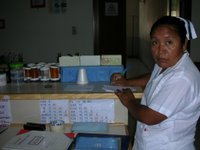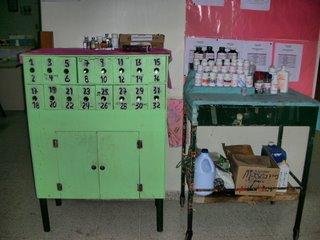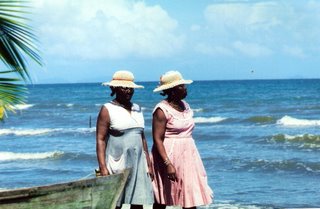
Monday, August 28, 2006
Thursday, August 17, 2006
Hospital Nacional
Wednesday, August 16, 2006
The Puerto Barrios Project
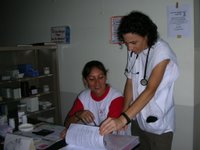 The Project I am working on here in Puerto Barrios is officially titled “Atención Integral A Las Personas Viviendo Con VIH/SIDA En Izabal.” This is translated roughly as “Interdisciplinary Care For People Living with HIV and AIDS in Izabal.” Izabal one of the poorest districts in Guatemala. It is also one of the districts with highest HIV/AIDS prevalence. The few hospitals and clinics equipped to diagnose and treat HIV/AIDS, however, are in the country’s capital. MSF runs the only HIV treatment clinics outside the country’s capital.
The Project I am working on here in Puerto Barrios is officially titled “Atención Integral A Las Personas Viviendo Con VIH/SIDA En Izabal.” This is translated roughly as “Interdisciplinary Care For People Living with HIV and AIDS in Izabal.” Izabal one of the poorest districts in Guatemala. It is also one of the districts with highest HIV/AIDS prevalence. The few hospitals and clinics equipped to diagnose and treat HIV/AIDS, however, are in the country’s capital. MSF runs the only HIV treatment clinics outside the country’s capital.Although there is little reliable epidemiologic data, Guatemala is thought to have an HIV prevalence of approximately 0.9% (UNAIDS Data). For those of you who do not have the stats at your fingertips, 0.9% prevalence is higher than that of the US (about 0.6%), but much lower than the prevalence in Sub-Saharan Africa (south Africa 18%, Lesotho 23%, Uganda 7%).
The Izabal project was started by MSF-Espana in 2003. As I understand it, Guatemala was making little progress with prevention, diagnosis, and treatment of HIV in the early 1990s. The few facilities that were managing HIV patients were all in Guatemala City. MSF Espana started this project in order to decentralize HIV/AIDS care and offer care to poor people who cannot afford to travel to Guatemala City. In addition to managing the field work in Izabal, the MSF Espana capital team works with the Guatemalan Ministry of Health on logistics of ARV purchase, among other things.
I work in the HIV/AIDS clinic in Izabal’s District Hospital (Hospital Nacional). We have about 800 outpatients, who come as far as the Northern border of Guatemala/Mexico. Many patients have to leave the day before their appointment in order to get to the clinic on time. They travel up to 12 hours on dirt roads to get to the Hospital. They sometimes sleep overnight in a room attached to the hospital. We also take care of all the HIV/AIDS inpatients.
Outside the Hospital, our team also organizes the HIV program at the Children’s Hospital and the “Centros de Salud,” trains counselors, supplies HIV tests, buys Anti-retroviral drugs and medicines for opportunistic infections, organizes press campaigns, and supports community groups and education.
After three years, MSF is attempting to” handover” all of the HIV/AIDS education and care to back to the Guatemalan public sector. Supposedly, the government will take full financial and organizational responsibility for the hospital, pharmacy, and clinics by 2008. In 2007, the Global Fund for AIDS, TB, and Malaria will financially support the HIV programs. MSF will watch from afar. We will keep an office in Puerto Barrios and Guatemala City until July 2007. After July 2007, the project is scheduled to officially close, and MSF-Espana will likely leave Guatemala altogether.
I have not been here long (and I do not know much), but I have little hope that the government will be able to actually supply and run a clinic after MSF leaves. Dolors (our Project Coordinator) thinks the Children’s Hospital might manage, but they only have about 25 patients with HIV/AIDS. The HIV clinic at the Hospital Nacional has more than 800 patients, however, and the hospital is a Disaster (more on this later). [Yes, it is even more inefficient than a certain Northern Manhattan Hospital.] . Henry, the Guatemalan doctor who I work with, plans to leave when MSF leaves. He says that the government will not pay him enough to live.
The leadership and organization of Izabal’s Hospital Nacional is only part of the problem. Guatemala’s public hospital system itself is precarious, to say the least. Since July 2006, the doctors in public hospitals nationwide have been intermittently on-strike. They are not asking for salary increases. They want supplies for the hospital and clinics. The doctors say that the Ministry of Health does not buy the medicines and supplies they need to take care of patients.
Even if the Hospital Nacional maintains the HIV clinic organization and Human Resources that MSF set up, at times I have little hope that the government will stay on-top of ordering medicines and supplies. I worry that much MSF’s work will be lost, and our patients will be left without medicines and perhaps without staff to take care of them.
There is much internal debate within MSF about the presence of the organization in non-emergency settings. Should this NGO get involved in chronic care in the first place? Does HIV/AIDS count as chronic care or is it an emergency epidemic? Should MSF stick with emergency care during a war or after a natural disaster? Can we leave Izabal before we are sure that the Government will take care of our patients?
Tuesday, August 15, 2006
Soledad's Goodbye Party
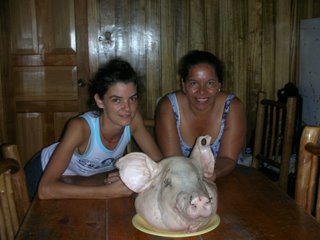
Soledad (Sole) is a 20-something nurse from Sevilla Spain. She only has one name-- like Madonna--no last name. She is on the left in the photo above, right behind the pig's right ear.
Sole worked on our project in Puerto Barrios for a year. She is warm and friendly, but not annoying like most warm and friendly people. She works hard during the day, then socializes at night. She drinks like a fish. Everybody loves her (including me). She is trying to learn English. She knows plenty of words, but her accent is so strong that I cannot understand her. It took me a week to figure out she was shouting "motherfucker" when she had trouble locking the office gate.
Sole planned her good-bye party for the Saturday before she left to go back to Spain. She invited everybody she knew in Guatemala: staff from the four Centros de Salud, hospital employees and their family, neighbors and random friends she made walking down the street. Half of the Guatemala City team took a 6 hour bus ride to Puerto Barrios. On last count there were 75 invitees.
The whole household helped get ready. Sole bought 10 bottles of rum, a few bottles of whiskey, a couple of bottles of vodka and gin, and seven cases of Gallo (cerveza). She made Mojitos in a massive water-cooler type bottle. I juiced a tub of limes. Norma dismembered and cooked an entire pig, which guests ate with salsa and guacamole, rolled up in warm tortillas. We peeled and boiled a wheel-barrow of yucca.
A friend of Sole's from Livingston set up a tent outside in the yard. He hooked up a stereo, which blasted Salsa and meringue all night. Everybody danced. I have no idea how many people finally showed up-- I was passed out upstairs by midnight, hours before the party ended. I woke up early on Sunday morning to go apply for a new passport in Guatemala city. Legend has it that party guests slept on the floor overnight, then got up and partied for another 12 hours on Sunday. The pic above right shows guests dancing on the second day of the party.
Casa Puerto Barrios
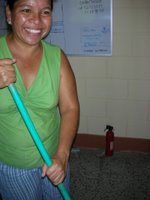
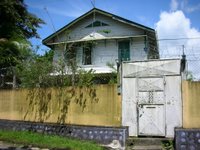 This is where we live (pic at left). Note the iron gates and barbed wire. We need three keys to get into our house and four keys to get into the office. We also have an alarm system (in a town where many people live in wood shacks).
This is where we live (pic at left). Note the iron gates and barbed wire. We need three keys to get into our house and four keys to get into the office. We also have an alarm system (in a town where many people live in wood shacks).I have my own room upstairs. Norma and Luz are our housekeepers (pic of Norma sweeping at right). They shop, cook our food, wash our clothing, and clean the house and office. We have six bedrooms, three bathrooms, cable TV (in Spanish), a garden with a hammock, and a fridge full of food. I am told that our quality of life is much better than most MSF missions. The only drawback is the occasional scorpion we find on the kitchen or living room floor
In addition to our meager yearly salaries, MSF pays us a per diem for food and expenses. Out of that perdiem, each ex-pat puts 800 quetzales (about 100 dollars) each month into a pot for food and household expenses. We spend the rest of our per diem on drinks, snacks, personal items, and weekend travel.
Norma and Luz cook delicious meals. We usually eat eggs, toast, juice, and pancakes for breakfast. I always hog the coffee. For lunch, we have all forms of cow, pig, bird, and fish either alone or in soups, stews, or empanadas. We also eat salad, steamed vegetables, rice, tortillas, and sometimes beans or pasta. We drink fresh-squeezed orange, papaya, or pineapple juice or milkshakes.
I am not sure how much we pay for rent here in Puerto Barrios, but I am certain that it is considerably less than I paid for my overheated one-bedroom apartment in Upper Manhattan. In NYC my fridge only had horseradish, beer, frozen York peppermint Patties, and chocolate covered pretzels (on a good day).
Monday, August 14, 2006
The Puerto Barrios Team
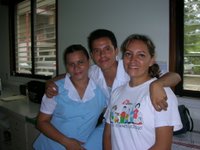
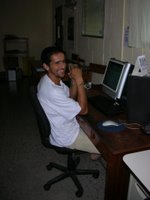 All MSF teams are are staffed by both “ex-pats,” (volunteers recruited from the MSF sections), and “local staff.” The ex-pat staff generally lives in the same housing. Members of the local staff live in their own homes.
All MSF teams are are staffed by both “ex-pats,” (volunteers recruited from the MSF sections), and “local staff.” The ex-pat staff generally lives in the same housing. Members of the local staff live in their own homes.There are three other “ex-pats” on my team: Conrado, a nurse from Columbia; Rafa, a logistican from Spain; and Dolors, the field coordinator from Spain. There was a fourth expat (Soledad, a nurse from Spain), but she went back to Spain soon after I arrived. Because our project is down-sizing, she will not be replaced.
Dolors, Rafa, Conrado, and I live together in the same house (see below). Dolors has done seven previous missions with MSF. Conrando was in Sudan for a year, and Rafa, like me, is on his first mission. Our local staff are: Felix (driver), Pedro (driver), Lissy (nurse), Leti (social worker), Jairo (press and communications), Celina (psychologist), Luz (cook and housekeeper), and Norma (cook and housekeeper, pic above).
I am the only person on our team who speaks English. Although the language barrier is sometimes frustrating, it is interesting to live and work with a multinational team. It takes considerable strength to be the only American around, however. In case you haven’t noticed, everybody hates the United States. Thank you George W Bush.
The pics above are of Conrado (seated in chair), and Lissy (on right, in clinic above). The pic below is of Soledad with arm around Rafa.

Sunday, August 13, 2006
Getting to the Field
Twenty four hours later, I took the shuttle back to Terminal 2 of the Charles De Gualle International Airport. The flight from Paris to Miami flight was also delayed. I arrived in Miami with less than an hour to get through customs and immigration. I had to run clear across Miami International Airport to get from Air France arrivals to TACA departures.
I had no idea who would meet me at Guatemala City airport the evening of July 28th. My luggage, of course, did not make it to the baggage claim belt with all the other suitcases. After filing my lost baggage complaint, I was the last person out of the terminal. I stood outside the airport exit for a few minutes, worrying that I had been forgotten. I looked around for somebody who might be looking for me. After five long minutes I spotted a MSF pick-up. I waited outside the truck until a man in a MSF t-shirt came back to the vehicle.
Giovanni is a driver for the MSF Guatemala City team. He told me that I would be staying with Olivier, the finance/administrative coordinator for the MSF capital team. I later learned that there are three separate MSF apartments in the same building. Patricia (the Head of Mission) lives in one apartment, Regina (MedCo) lives in the second, and Olivier lives in the third. Members of the capital team are allowed to live in their own apartments with their families, as long as they keep open rooms for staff members who need to stay in the capital en route to and from the Field.
Olivier greeted me at the door of his apartment. He is French by birth, but speaks fluent English and Spanish. He arrived in Guatemala city just two weeks before I did. His wife (who is Spanish) and 8 month old son are joining him in Guatemala City later this month.
Olivier told me that I would spend Friday and Saturday in Guatemala city. I was supposed to “be briefed” by the Head of Mission, MedCo, and Logistics Coordinator (LogCo) before I left for the field. But because Patricia and Regina were on vacation, I would only meet with Guillermo (the LogCo) before leaving for Puerto Barrios via bus on Sunday morning.
Barcelona Briefing--July 24th-25th 2006
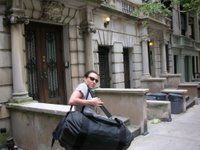

I had no idea what my work setting would be like. What should I pack? Nobody seemed to know. I packed mostly books and chargers for my various gadgets: ipod charger, laptop charger, cell phone charger, camera charger, digital card reader. I also brought a personal pharmacy of bare essentials: Trimethiprim (Bactrim) and Ciprofloxacin (Cipro) for bacterial infection, Metronidazole (Flagyl) to treat Entamoebia Histolytica, Diphenhydramine for allergies and/or sleep, Ibuprofen and Acetaminaphen for aches and pains, Imodium and Bismuth for diarrhea, caffeine tabs for coffee
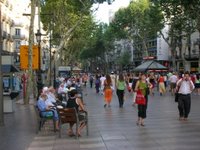 withdrawl (god-forbid), Albendazole for Ascaris Lumbricoides and/or Strongyloidiasis, Chloroquine in case of malaria (no resistant Flaciparum in Guatemala), as well as my regular-old psychiatric medicines.
withdrawl (god-forbid), Albendazole for Ascaris Lumbricoides and/or Strongyloidiasis, Chloroquine in case of malaria (no resistant Flaciparum in Guatemala), as well as my regular-old psychiatric medicines.I left New York for Barcelona on July 23rd. I did not weigh my duffel bag, but it felt like more than 20 kg. I could barely lift it. (I am trying to lug my big fat bag to a cab the am of departure in pic above right.) The overnight flight via Frankfurt was uneventful. I took a cab from the Barcelona airport to the Hostel Opera just off the Rambles in central Barcelona (pic at right). Soon after I checked in, I got a call from Carmen in the MSF office. She told me to come to the office by 4pm to start my briefing (pic of MSF-Espana office above left).
As I feared, my entire Barcelona briefing was in Spanish. The strange Catalunyan accent and the red-eye/jet lag fatigue on top of my baseline Spanish deficiency left little hope for decent communication.
I spoke to Dolors first. Dolors is the Field Coordinator for our project in Puerto Barrios. She was originally trained as a nurse, but has been working in the field for MSF in various capacities for years (about 7 missions worth of experience). Doloros happened to be passing through Barcelona on her way home for vacation. This was a fortunate, as she was the first person who was able to tell me about the actual project. I was alarmed to learn that the doctor who I am replacing left more than a month ago. Who would train me? To make matters worse, Doloros, my direct supervisor, would be on vacation for more than a month. On top of that, Regina, the medical coordinator in Guatemala City (my back-up for technical questions), would also be on vacation for a month. Who would tell me what to do?
Doloros assured me that Conrado, a Nurse from Colombia, was in charge as the Acting Field Coordinator for the month. He will show me around and tell me what to do. Also, I would start by working along side of Henry, the Guatemalan doctor on our team. I was nervous.
I want back to the MSF-España Headquarters on July 25th. Click here to go to the MSF-Spain Website. I was scheduled to meet with Carmen (HR Assistant), Monica (Human Resources Officer), Sylvia (Medical Operations), and Paul (Epidemiologist). Monica is Kath’s equivalent in the MSF-Spain office. She discussed more or less the same topics that Kath had already told me, except all in Spanish: benefits, MSF hierarchy, the importance of security, cultural sensitivity, evacuation in case of emergency etc.
Sylvia’s formal title is TESACO, which must stand for something. She is in charge of medical operations for cell #2 of MSF-Espana. Each cell runs missions in different countries. Cell #2 runs projects in Guatemala, Bolivia, Columbia, Ecuador, Congo, and a few other countries. Sylvia did not get into much detail about the project. She told me that all the projects in Guatemala are winding down, nearing the “transpaso,” which means handover stage. This means that MSF is preparing to pass the work over to the local practitioners and health system (more on this later).
On my way out, Carmen gave me my plane ticket for departure to Guatemala City via Paris and Miami on July 27th. Somebody would meet me at the airport, she said. I was issued copies of MSF “Clinical Guidelines, Diagnosis and Treatment Manual” and MSF “Essential Drugs,” manuals. On the way out I stopped by the “Punto de Salida” to pick-up mail for delivery to staff in Guatemala.
Saturday, August 12, 2006
New York Briefing--July 19th 2006
More instructions: I was only permitted to bring 20 kg of luggage; MSF would pay for public transportation to the airport and hotels; they would not pay for taxis. She gave me the address for the Hostal Opera, just off theRambles in Central Barcelona. She said I should take the airport bus to the last stop, walk to the hotel from there, drop off my luggage, then stop by the Barcelona MSF office and ask for Carmen.
After we finished travel logistics, Kristen checked a table of required vaccinations for Guatemala. She told me I needed to go back to the Traveler’s Medical Clinic on Madison and 57th to get two out of a series of three rabies shots. Barcelona would arrange the “cold chain” to deliver my third vaccination to the field. [It is called cold chain because the vaccine needs to be refrigerated.] She handed me notarized copies of my medical school diploma and New York State license. That completed her part of the briefing.
I had many questions: Will I have email access? What kind of clothing should I bring? What kind of medical equipment should I bring? Who will tell me what to do when I get there? Kristen did not seem to know.
The briefing with communications was short. The jist of it: I could take pictures of my field work, but I should avoid face shots unless I had permission. I should refer any calls from journalists to the press department. I could volunteer to give talks when I returned from my mission.
I came back at 5pm to meet with Kath. Kath is Australian by birth, but has lived all around the world. She has many years of field experience with MSF. She started on a administrative/finance post in Ethiopia, where she met her husband.
I hoped that Kath would finally tell me more details of the project and my work responsibilities. Unfortunately, she did not have all the specifics I was looking for. She reviewed a lot of the information from the general orientation I attended in April. She reminded me that MSF has a chain of command that should be respected. My project is with MSF-Spain. The Field Coordinator in Puerto Barrios will be my direct supervisor for general matters. If I have an issue with the Field Coordinator, I should contact the Head of Mission, who runs all the MSF-Spain projects from Guatemala City. The Head of Mission reports to the Operations center in Barcelona. For technical questions or issues, I report to the Medical Coordinator (MedCo), who supervises all Field Doctors in Guatemala. The MedCo is supervised by the TESACO, a doctor stationed in Barcelona, who runs the medical
side of many projects all over the world.
After a discussion of a few more general matters (learn the names of the National staff, make sure you get your security briefing when you arrive in the Capital, learn how to use the satalite phone in case of emergency, take care of yourself if you get sick, etc etc). Kath said goodbye and I left. See you in 9 months.
Friday, August 11, 2006
My Field Assignment
I was half asleep when Kath called that morning. She said there was a potential job opening in Guatemala. Shit! I already told them I did not want to go to Guatemala. Apparently this was a different project. She said she would e-mail me a project description. Could I get back to her by later that afternoon? I fell back asleep.
By the time I got up and opened my email, I had about six hours to decide whether I wanted to take the Guatemala post. The file Kath sent was in Spanish. It described an HIV/AIDS antiretroviral treatment project in Puerto Barrios Guatemala. This was different from the Guatemala City project that I had already vetoed.
I called Kath back and told her I was interested. She told me that they needed somebody as soon as possible. Could I be ready to leave by 7/23/06? I would need to go to Spain “on the way” to Guatemala for my Barcelona briefing. That left 10 days to pack my possessions, move out of my apartment, and say goodbye to my friends and family.
Thursday, August 10, 2006
MSF
MSF is currently divided into five separate Operational Centers (OCs) and 19 Sections. The OCs are in France, Belgium, Switzerland, Spain, and Holland. They run field operations in 80 countries around the world. The Sections recruit volunteers, raise money, and manage publicity. They do not do “operations” (plan and coordinate field missions).
The MSF/Doctors Without Borders United States Section opened an office in New York in 1990. The NYC office recruits American health care workers and logistics persononel for the OCs. They ask medical volunteers to commit for at least six months. Non-medical people have to commit for longer. Volunteers cannot request a specific post or geographic assignment. Click here to find out more about how to volunteer with MSF/Doctors Without Borders.
After an application and interview, an applicant may be “accepted into the volunteer pool.” Each week the Human Resources staff in New York reviews vacant mission posts from the OCs for possible matches with volunteers awaiting field assignment. If HR thinks you might be a potential match, they call you and ask if you are interested in the post. They usually have only scanty information about the project goals, work requirements, and work setting. On top of everything, they give you only a few days to decide if you want the post. If you accept, and the OC agrees that you meet the job requirements, you are assigned to the field.
Wednesday, August 09, 2006
My Old Life
Although my patients in New York are poor by US standards (mostly immigrants, elderly, a few working poor), I sent them for endless expensive high-tech diagnostic tests. I also prescribed thousands of dollars of medicines per patient per year. Many of them were taking more than 10 or even 20 medicines daily for their chronic diseases: obesity, hypertension, diabetes, coronary artery disease, cerebrovascular disease, heart, liver, and renal failure.
In medical school I learned how to order diagnostic tests. Testing and expensive treatment for chronic disease are generally accepted as the "standard of care" in tertiary modern American medicine. I learned to practice this way during my residency training. I also taught my medical students and residents how to practice this way.
However, the problems in the American health care system--the paperwork, the insurance system, the waste inherent in multiple often unnecessary diagnostic tests, the administrative demands on primary care doctors, and the lack of care available to the uninsured/underinsured population-- started to bother me. Things that were driving me crazy: patient requests for $6000 motorized "scooters," patient requests for "brand name medicines," serial MRIs for tension headaches, "prior authorizations" for Medicare meds, Tayna in 207, sad state of innovative medical education at certain Upper Manhattan Medical Center. I wanted to go somewhere with different problems.
Tuesday, August 08, 2006
Puerto Barrios, Guatemala?
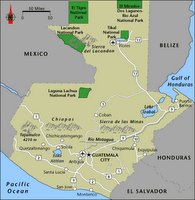

I am in Puerto Barrios, Guatemala. Puerto Barrios is a port town on the Eastern coast, sandwiched between Belize and Honduras. I have been here for just over a week. I still think about the heat constantly. It is stiffling hot and humid today, like it is every day of the year here on the Atlantic coast of Central America.
Luckily the MSF/Doctors Without Borders office is air conditioned. The hospital where I work and the house where I live do not have A/C. We have fans in the house, and big windows that allow for a cross breeze. But the hospital feels like a sauna. There is little ventilation. Some of the patient rooms have fans, but most of them seem to be broken. The patients in the hospital are grouped together in large rooms, like the traditonal "wards" in US hospitals. The beds do not have sheets. The patients lie on their dirty matresses and sweat.
The heavy rains are the up-side of the tropical climate. It pours here at least once or twice a day, complete with lightning and crashing thunder. Sometimes the din of rain splashing on tin roofs makes it impossible to talk. At work, we have to take a break from seeing patients until the noise lets up. Usually the rains come at night, when I am lying in bed waiting for sleep. Exotic bird chirps and rooster cock-a-doodle-doos wake me in the morning. The dirt roads in town are more like muddy bogs. I am learning how to drive the 4-wheel drive truck.
I am also tired of speaking Spanish. I used to think my Spanish was adequate. That was when I only had to talk to patients at work in New York. Now I have to speak spanish at work, at home, and on the telephone. I have to write my medical notes in Spanish, and read charts and reports. Nobody on my team speaks a word of English. I feel like a first grader who was sent to grad school by mistake. Grad school in the tropics.
What on earth am I doing here?
